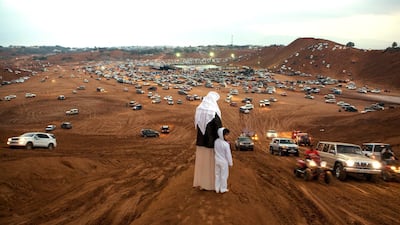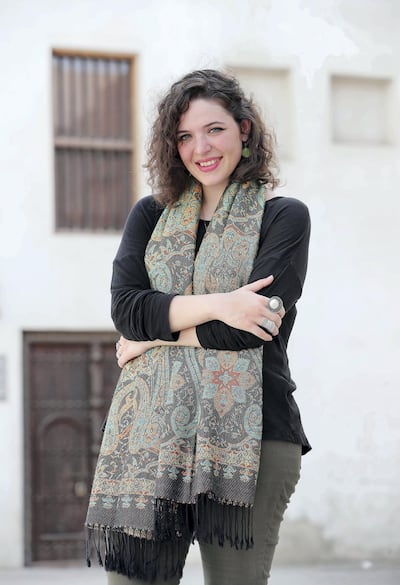Whether she is at a Dubai nightclub, at the top of a dune, or at a Nabati poetry duel, Vicky Tadros is always listening.
“I go to a club and I’m the nerd in the back with the notepad,” she says.
Tadros is a PhD student in Ethnomusicology at the School of Oriental and African Studies, University of London. Her research asks, what do contemporary Emirati listening practices tell us about Emirati culture? Or, what types of music are Emirati citizens listening to, and why?
If a preference for American pop star Ariana Grande over renowned Egyptian singer Umm Kulthum appears frivolous, think again. The way we listen to music can reveal much about changing power structures, explains Tadros. “Contemporary life in the UAE is structured around the push and pull of contrasting core values, such as the sacred and the secular, and the traditional and the modern,” she says.
“My research addresses how these values underpin the way in which Gulf countries negotiate power and identity through their respective cultural industries.”
How music is tied to individual identity
Tadros is not Emirati, but of the Gulf – she’s half-English, half-Egyptian, born and raised in Sharjah. She is a classically trained pianist and opera singer and her research is a way for her to make sense of her home through the medium she knows best. “Listening is omnipresent in our lives,” she tells me over tea at a Levantine cafe on the Sharjah Corniche. “At this minute, we’re listening to Umm Kulthum and at a Lebanese-Jordanian restaurant in Sharjah. We’re always bombarded with music.”
While most musical study investigates the pre-oil music of the Gulf, Tadros is focused on the contemporary. She has spent the past eight months talking to DJs, producers, poets, scholars, musicians and everyday listeners to find out what is present, and notably absent, from Emirati listening practices and will return to London this autumn to write her dissertation.
In every culture, music is tied to individual identity and reflects society at a broader level. In the UAE, where Emirati citizens comprise 11 per cent of the population, citizens can feel a responsibility to present a particular national image through behaviour, and this includes musical tastes.
“As contemporary Emirati society is organised according to contrasting core values, such as the modern and the traditional, understanding how and when to express these identities in daily life becomes a negotiation of cultural capital,” explains Tadros.
Naturally, taboos change over time. Tadros recalls attending a Balochi-Emirati wedding with a reggaeton and Khaleeji playlist. Elderly guests at her table declined to dance and one explained that her own wedding was without music as it “was not the right thing to do” in her youth.
Tadros has found the younger generation, who have been raised in an era of nationalism, are more guarded in their responses. For some, appropriate music changed with the time of day. One young man described his ethical listening schedule that progressed through the day from Arabic classics from the likes of Lebanese singer Fairouz to Khaleeji and English pop. The end of each prayer signalled shifts to more secular music.
A social narrative in the region
Space plays a role. For many, the car is a private place to test the boundaries of what is appropriate to family members, be it their acceptance of Emirati pop singer Ahlam, or superstar Swedish DJ Avicii.
“When I am in traffic, one of my favourite things to do is to roll down my windows and listen,” says Tadros. “Anyone who has been in traffic jams knows it is not just car horns. For example, Quranic recitations are going by, and that gets bombarded with [Lebanese singer] Nancy Ajram. All of these sounds essentially become a wider picture, a social narrative and it’s completely and utterly Gulf.”

She found subtle differences between the emirates. In Sharjah, she notes a fondness for the Emirati singer Mehad Hamad, who romanticise the desert and Bedouin lifestyle, and the Armenian-British singer Sami Yusuf, whose uptempo nasheed, or eulogies, praise the glories of God. This contrasted with the western focus of Dubai or the federal capital of Abu Dhabi that projected a curated image of the modern and inclusive.
In the sands of Al Naqrah, in Abu Dhabi, young dune-bashers told her that while in the desert, tunes blasted from their 4x4s should be by traditional singers. “Even though the desert was being experienced in a thoroughly modern way in a turbo engine, it was still a way of ‘being Bedouin’,” says Tadros. “It’s embedding this idea that, ‘I’m part of the tribe, I’m part of the community, I’m listening to the Bedouin music and engaging with the desert and surroundings around me’.”
As one man told Tadros: “I only listen to Mehad Hamad when I’m in the desert. For me, Mehad Hamad is telling me about my history, my story, my culture, my everything.”
Tadros adds: “You just have to walk around the malls or around public spaces and you always see this sort of reimagined self. It’s kind of top-down, this romanticisation of the desert or pearling, and that feeds into music as well. It is trying to embed a reimagined past in a contemporary society in a contemporary way, which is important because when you are a minority in your country you want to make sure that your voice is heard and your culture is seen among the myriad cultures.”
'Pop culture reveals a lot about a people'
Conspicuous, too, is what is absent. As the country unifies, music becomes streamlined and elements get lost. “There was a move to make everything uniform, to nationalise all art forms and as a result, some of the local variants that should be present, that are equally important, are out of the conversation,” says Tadros. An example is the disappearance of women from traditional art forms such as ayala dancing or pearling music.
Tadros’s research is part of growing scholarship on contemporary Emirati identity. “Academics in recent years have begun to discuss Khaleeji identity as a result of the Gulf’s economic growth,” says Tadros. “However, there is still a very limited amount of knowledge pertaining to modern-day Khaleeji identity and cultural values. “Musically, there are even fewer resources, with most of this research being concerned only with pre-oil musical styles such as pearling music. I am aware of academics in the region seeking to address these gaps in the literature, which alongside my work, will hopefully encourage further discussions and counter arguments.”
______________________
Read more:
Follow these seven steps to master the Khaleeji art of 'rounding'
Press rewind: why cassettes are still king for one Abu Dhabi shopkeeper
Emirati love songs discuss matters of the heart in the classy way
______________________
Hind Mezaina, an Emirati artist and founder of The Culturist blog, says the work’s attention to pop culture matters. “I know most people think of pop culture as nothing serious, but I think it should be studied and written about because it’s a reflection of society and taste and history,” she says. “Pop culture reveals a lot about a people, place and time. I feel there aren’t enough studies here about this.”
“There’s more attention [to the Emirates] from other angles – construction, business and economy. Some study what is always promoted as traditional music. She’s looking at it from a much wider and very contemporary perspective, what music means today.”
By moving the conversation about music to the present, it challenges stereotypes and portrayals of Emirati citizens as a homogeneous group. “A lot of conversations don’t include today; it’s always [about] the past,” says Mezaina. “It’s something that will make people pause to think. These discussions are important to have.”
By listening to the Emirati soundscape in its entirety, Tadros’s research hits all the right notes.


